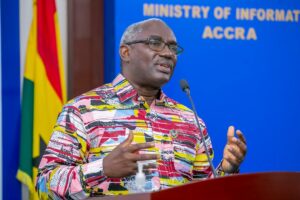Lack of sustainable financial instruments hampering execution of national plans – NDPC

Dr Kodjo Esseim Mensah-Abrampa, the Director-General of the National Development Planning Commission (NDPC), has attributed the apparent inertia by successive governments to complete projects initiated by their predecessors as technical rather than political.
The lack of sustainable financing mechanisms for many governments led projects is a huge impairment for the smooth execution of numerous stalled projects and programmes across the country, he noted.
Dr Mensah-Abrampa told the Ghana News Agency the phenomenon of either abandoned, neglected, or stalled projects were widespread and must be tackled with the urgency it deserved.
“Many Ghanaians cannot comprehend the inherent reasons for governments refusing to continue policies, programmes and projects of previous governments that are were intended to serve public good. But I can tell you on authority that, it is largely technical than the speculated political strings.”
“Technical in the sense that, in the past what we did was that, when a programme was prepared, governments went to look for funding and sometimes got 40 or 50 per cents of the total funding amount. Thereafter, governments gave the project on contract hoping to raise the remaining amount but often do not last to complete them.”
However, new governments take over only to realize the projects were no monies to complete them, leading to delays and consequential inflationary pressure, putting extra financial stress on government, hence the look warm attitude.
Notwithstanding, he said the Commission was putting in place pragmatic measures to ensure new projects and programmes had reliable sources of funding to prevent same.
He said the commission recognized the important and unique role placed on it by the Constitution and that will work harder to deliver a framework that captured the aspirations of the Ghanaian people, taking into consideration both technical and political processes.
According to him, the Commission was expected to synchronize and harmonize the multiple frameworks for national development, namely, Ghana at 100, Ghana Beyond Aid and the Ghana CARES Obatanpa among other Programmes into the national medium-term development policy framework from 2022 to 2025.
It would also integrate and evaluate the extent of the long term and mid-term progress made in the implementation of policies, programmes and projects towards the national development objectives and goals of the current Medium-Term National Development Policy Framework (MTNDPF).
The mid-term evaluation sought to draw lessons to serve as inputs for the design and implementation of the successor MTNDPF, 2022-2025.
He said the relevance of development planning, and for that matter its role, was hinged on making proposals that responded to long-term aspirations and needs, resulting in the necessary structural transformation of the national economy.
The evaluations, he indicated were in line with their mandate as the foremost constitutional body responsible for advising the President on development planning policy and strategy.
For that matter, it remained committed to studying and making strategic analysis of macroeconomic and structural reform options, making proposals for the development of multi-year rolling plans and taking into consideration the resource potential and comparative advantage of the different districts of the country.
That will enable them makes the necessary proposals to government, particularly the protection of the natural and physical environment, with the view to ensuring that the development strategies and programmes are in conformity with sound environmental principles.
The NDPC is also charged with making proposals for ensuring the even development of the districts of Ghana by the effective utilization of available resources, among others.
Nonetheless, the Director-General of the Commission called for a sustained development of responsible, responsive, accountable, and people-focused leadership in public sector institutions.
Public servants, he stated, must be facilitated to network, collaborate, and share ideas among the institutions to enhance co-learning for the improvement of the sector.
Dr Mensah-Abrampa said effective governmental coordination was required within sectors and at all levels of Governmental institutions for efficient performance and outcomes.
Source: GNA
